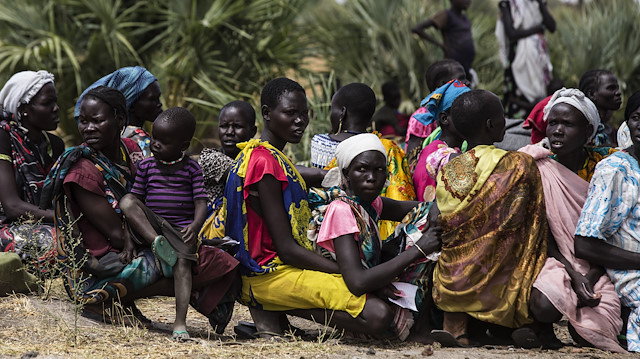
Transitional government blames old guards of 'staging coup to regain power, dampen spirit of revolution'
The night of Jan. 14 will be remembered by Sudanese for years to come for the blood it spilled in the capital Khartoum.
The night witnessed large-scale clashes between loyalists of the old regime and army units backed by the paramilitary raising fears that the country would face yet another political conundrum.
Eyewitnesses in Bahri, Omdurman, Riyadh and Suba neighborhoods in Khartoum told Anadolu Agency that both sides used heavy weapons including tanks, artillery and even military choppers.
“We all saw the heavy weapons being used including tanks and artillery. The sounds of bombs and shells scared me and my three kids who hid under the bed,” Afaf Ahmed, a university teacher told Anadolu Agency.
“The building was shaking and the window glass shattered under heavy fire,” she added.
The violence has spilled over the rest of the country, killing five people, including two soldiers.
The transitional government has alleged this is a coup attempt by inner circles of former President Omar al-Bashir, who was ousted last year following mass protests, ending his 30-year-rule.
Based on a deal, the de-facto government will rule the Africa's northeastern nation for a 39-months period before heading to elections.
Mohamed Hamdan Dagalo, also known as Hemedti, the deputy chairman of Sudan's sovereign council, has accused the former spy chief of conspiring against the incumbent government.
Addressing a news conference in Juba, the capital of South Sudan, he said Salah Gosh, the former head of the National Intelligence and Security was the chief architect of the ploy to topple the transitional government.
“They were working on bigger conspiracy including the calls for the protests by the agents of the former regime in different parts of the country including Khartoum, Medani in Algazeer state as well as in West Kordofan state,” he said.
Wagdi Salih, spokesman of the ruling coalition of Forces for Freedom and Change, echoed this view.
He, in a press conference held earlier, said they have received information that the old guards "attempted to break into Kober Prison where Bashir and his close allies have been detained."
“What happened is not a small incident or only a case of mutiny by those who are asking for their retirement compensation but it is moreover a bigger plot by the deep state against the revolution,” he added.
However, a senior figure of the former ruling party denied these allegations.
Requesting anonymity as he is not authorized to speak to the media, the leader of the National Congress Party said "the transitional government is using this blame game as a guise to hide its failure to address economic challenges the country is facing."
The National Intelligence, for its part, said in an earlier statement that the clashed erupted in the capital following the transitional government's move to dissolve a military intelligence unit which comprises of more than 11,000 personnel. Of them, 5,800 have chosen to retire and they asked for compensation.
However, Hemdeti claimed their dues had been cleared 20 days ago.
“They asked for very high amount of money which is $23 million and despite the economic circumstances we provided this amount and it has been transferred to the accounts of the security organs like around 20 days ago,” he noted.
Sudan has been embroiled in a political crisis since last April when longtime leader Bashir was ousted.
The 76-year-old is serving a prison sentence for corruption, and is yet to face a host of charges against him including the 1989 coup that brought him to power and the 2019 crackdown that left scores of protesters dead and hundreds injured.
The country has faced sporadic clashes as various groups flex their muscles to gain power in the volatile political environment.


